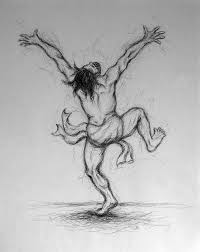I love these guys. They have by far the best theme song, that one about "we three kings of orient are" which I feel would work well recorded by Blur in their cheeky chirpy Cockney phase: "Field 'n' farntin, moor 'n' marntin, follerin' yonder star… oooooooooooooh!" I love how children don't know the verses but launch enthusiastically into the chorus again and again.
So. Wise people. Not necessarily men, not necessarily three. But apart from that…
Not necessarily these three.
Could you cast yourself as a wise man? They find their way into Matthew's gospel - Luke, for some reason, is less interested by them. And yet in several ways they fit the profile of the outsiders that his gospel champions. Maybe it was the wealth that did it?
Any road up, the Magi are foreigners. Not even Jewish foreigners! They're probably Zoroastrianists, which is a religion I can't even spell, let alone explain. It is one of the world's oldest religions, "combining a cosmogonic dualism and eschatological monotheism in a manner unique... among the major religions of the world." So now we're clear on that.
One of the reasons these funny foreigners with their funny accents and their funny clothes were received so well was because they brought presents. You'd be surprised how much suspicion can be dissolved if you've got gold. Or myrrh even. Or, as our lovely primary school children would have it, Frankenstein. Or Frankincest. That one.
Well, those gifts maybe go some way to counterbalancing their strange funny foreign ways. And maybe go a tiny step towards making up for clodhopping into Jerusalem and bringing down the wrath of Herod on the heads of a number of toddlers.
But what if you're just strange and have no gift to bridge the gap? What if you feel disqualified because you have no gift to offer? What, as the song goes, can I give him?
One of my favourite nativities (okay, one of my least favourite, coming a long way behind every angle one I've enjoyed in primary schools in seventeen Christmases in holy orders) is The Flint Street Nativity. It's an ITV thing, I think, in which grown-up comedians (Josie Lawrence, Ralf Little, Julia Sawalha) play primary school children putting on a nativity. Neil Morrissey - him off Men Behaving Badly and its curious sequel Bob The Builder - he plays the third wise man, the one with the frankincense.
Except. Except he has a lisp. Imagine.
So he brings frankinthenth.
That's the right Morrissey.
And he's mercilessly mocked by another wise man for his speech impediment and told he'll be sent to the specialist unit, so he spends much of the hour and the play hiding outside under the school climbing frame in the rain, desperately trying to say "Frankincense" without lisping. And he can't. Not to save his life.
Do you ever feel disqualified because of what you can't do? Or looked down on by anyone because you can't quite do something? I can't kick a football straight and my sense of direction is terrible. I have a major learning disability when it comes to driving (that's my phrase) a canoe, although that's mostly about learning in a large group under pressure. I can punt. But I can't do those slider puzzles to save my life.
Can do.
No can do.
What will Neil Morrissey do?
In the end the three wise men turn up at the Flint Street Nativity, and the first one declares, "I bring you… the gift of… gold." The second declares, "I bring you… the gift of… myrrh."
And Neil Morrissey, soaked through, holds out his slightly limp package and - after a long pause - says…
"I bring you…
… the gift of…
…
…
…more myrrh!"
Way to go, Neil. In your face, mockers. In. Your. Faces.
And if anyone ever looks down on you, in or out of church, just remember: more myrrh. Find out what God's given you and come on in. The people who look at you disdainfully? Screw them. Don't fit in with their ideas just to keep them happy. Rock their boats. In their faces. They're not worth your energy.
Us, today, we're less likely to disqualify ourselves because of race or religion, but we can all think of reasons why we don't think we belong. But God casts his net wide and opens his door beyond the hinges' limit to include us regardless.
Us lot, however unworthy we think we are, whatever we think might disqualify us, we're on the inside now, whatever you're bringing to the party. And our work is to bring other people from the outside into the inside, to turn the world upside down and inside out. To let people know it's okay not to bring frankincense if what they've got is more myrrh. And if our church isn't shaped right to let new people in, then our job is to knock down some walls until people can come in regardless of who they are.
Wise men: possibly scruffy seekers after something.
And if some traditional lot of snooty-nosed people look likely to get to those outsiders first with a frown and a disdainful sneer, a patronising air and the sense that they might be about to police the boundaries, then get in ahead of them. Don't let the church be run or represented by the stuffy. It's our church too.










































